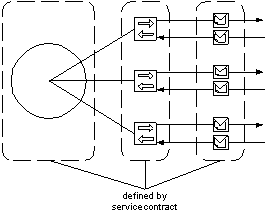|
|

|
|
Services share a formal contract
|
Service contracts provide a formal definition of:

 the service endpoint the service endpoint

 each service operation each service operation

 every input and output message supported by each operation every input and output message supported by each operation

 rules and characteristics of the service and its operations rules and characteristics of the service and its operations

Service contracts therefore define almost all of the primary parts of an SOA. Good service contracts may also provide semantic information that explains how a service may go about accomplishing a particular task. Either way, this information establishes the agreement made by a service provider and its service requestors.
 Service contracts formally define the service, operation, and message components of a service-oriented architecture. Service contracts formally define the service, operation, and message components of a service-oriented architecture.
Because this contract is shared amongst services, its design is extremely important. Service requestors that agree to this contract can become dependent on its definition. Therefore, contracts need to be carefully maintained and versioned after their initial release.
Within the Web services framework, service description documents (such as the WSDL definition, XSD schemas, and policies) can be viewed collectively as a communications contract that expresses exactly how a service can be programmatically accessed.
 This page contains excerpts from:
This page contains excerpts from:

Service-Oriented Architecture:
Concepts, Technology, and Design
by Thomas Erl

(ISBN: 0131858580, Prentice Hall/PearsonPTR, Hardcover, 792 pages).
For more information, visit www.soabooks.com.
|
|
|

|
|